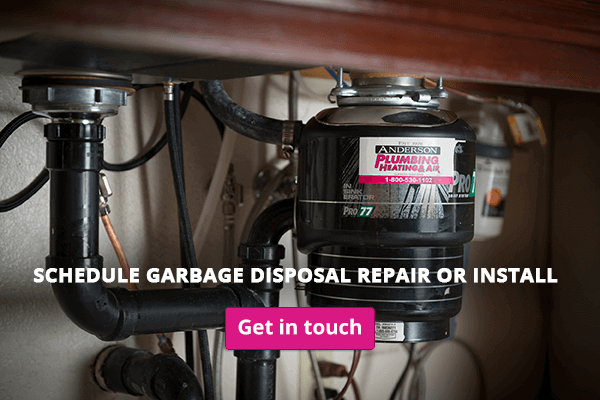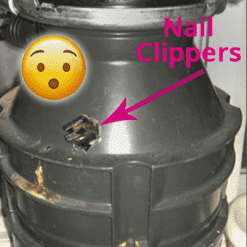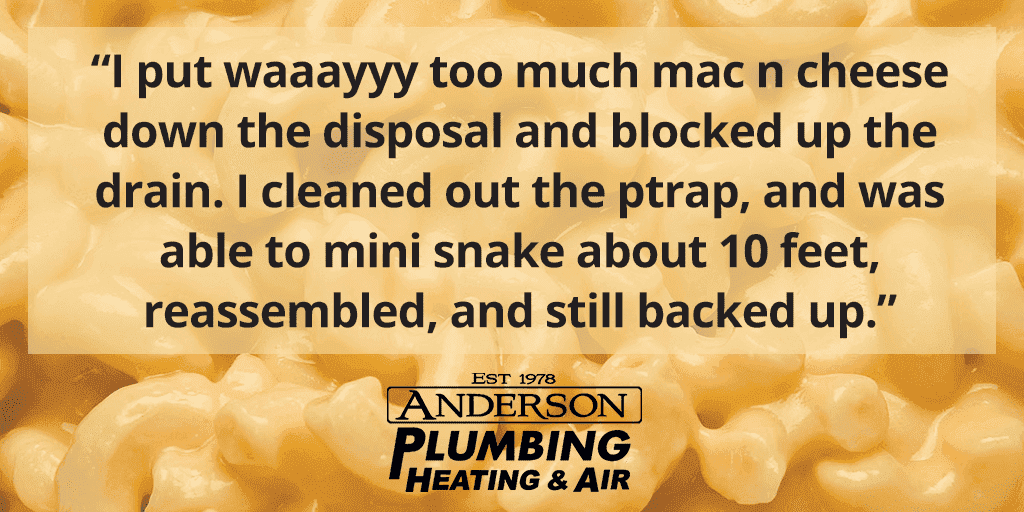The dispatch line rang and our customer service representative answered, ready to help with any plumbing-related issue.
“I need to get an octopus out of the drain,” a voice muttered.

“Okay, we’ll be happy to help,” the representative cheerfully responded and promptly sent a plumbing tech to wrangle the animal and inspect the disposal for damage.
San Diego is an ocean lover’s paradise and while that fresh, live octopus will make an amazing calamari dish – the octopus might not agree with your plans.
If and when you call to get an octopus out of your drain, Anderson Plumbing, Heating & Air technicians will calmly remove the scared cephalopod. (In case you are wondering, if you don’t prepare your calamari immediately or leave the catch in the sink, that dinner delicacy can crawl into the drain.)
If it can’t find a way out, it might sit and hold tightly to the moving components of the disposal, preventing it from moving.
Note: the cephalopod was safely removed from the kitchen garbage disposal.
Garbage disposals collect many things that don’t belong there. Of course, you know it isn’t the place for bones, fruit pits, or your wedding ring. Your plumbing service professional will gently remind you of this, just like your doctor will remind you that eating a fast-food burger every day is not good for your cholesterol.
Need a garbage disposal repair? Contact Anderson Plumbing, Heating & Air today!

Still, accidents happen, and haste makes waste! Kids, for example, will stuff things down the garbage disposal rather than stopping at the trash compactor or trash bin.
Garbage Disposer Don’ts
Once upon a time, our grandparents lived without garbage disposals. This is probably more shocking to some than an octopus in the drain.
Back then, waste was collected in the sink and then thrown out – in the trash bin. Today, with high-powered motors, garbage disposals can break down and liquefy almost anything. However, there are some items that should never go down the garbage disposal.
- Grease and fats: Often the problem with grease, fats, and cooking oil is that they create problems further down the waste disposal system. They solidify, making sludge and create clogs. Do not send grease and other fats down the drain, not even with hot water/soap.
- Bones and Fruit Pits: This should be common sense, but it is a frequently seen problem for plumbing service appointments where garbage disposals fail. They can damage the blades or just don’t ever get broken down, creating a mass of items to block the sink drain.
- Rice, Pasta, and Coffee Grounds: This is one that isn’t as much common sense as others. You might see these “digestible or dissolvable” items. But, what happens in the garbage disposal is detrimental to the appliance. As these mix with water and other foods, it becomes sludge that can jam the blades, slowing or limiting rotation.
- Celery, Carrot, or Potato Peels: Celery has very long and strong fibers throughout the stalk that can tangle in the motor of the blades. Asparagus and corn husks provide the same risk. The same for carrot or potato peels.
- Egg Shells, Shellfish and Fish Scales: There is some debate as to whether eggshells are bad for the garbage disposal, with some people saying there is no harm and the grinding of the shells actually helps sharpen blades. There are other ways to sharpen the blades without having slimy linings potentially stick and clog the shredder.

Reading this too late? Call now. We’ve helped customers just like you with kitchen disposal repair for over 45 years!
Do’s for Garbage Disposal Health
As with any household appliance, maintenance helps reduce problems and increase the lifespan of items. Garbage disposals and garbage disposal repairs are no different. They are part of the household waste lines and require everything from the vent stack to the sewer waste disposal to function efficiently to prevent problems.
- Dishwasher Use: Dinner clean-up is much easier with a dishwasher. Make sure the dishwasher hookup properly drains into the sink and don’t just let the waste flow down the sink drain. Rinse plates before you put them in the dishwasher to make sure excess food and taboo junk doesn’t make it down the drain (or jam the dishwasher).
- Cold Water: Use cool or cold water when running the kitchen faucet and garbage disposal to make sure any grease on plates and dishes isn’t liquefied. You don’t want it to later become a solid deep down in the pipeline of your plumbing and drain system.
- Waste Trap: Use a mesh drain strainer that you can buy at your favorite Point Loma, Mission Hills, or and other local San Diego housewares store to collect food, skins, peels, and bones before they go down the drain. Then, throw them out.
- Clean the System: Use a homemade drain cleaning solution to help reduce grime, muck and sludge build up. A quick DIY utilizes baking soda, vinegar, and lemon to break down sludge and deodorize the appliance. Some folks will actually mix ice cube with lemon and vinegar to help sharpen blades while cleaning.
- Stop and Clear: If you find an octopus or anything else that is the core problem for your sink drain and garbage disposal problem, turn it off, unplug it and work to remove whatever it is that’s blocking or clogging the system. If this isn’t something you are comfortable with, make an appointment with your local plumbing service.
What Can Go Down the Garbage Disposal?
Now that you know the fundamentals of keeping your garbage disposal healthy, it’s time to discuss some of the items you can “feed” it!
- Most Fruit and Vegetable Leftovers: From strawberries to carrots, your garbage disposal will be able to handle an abundance of healthy eats! However, to make sure you’re not straining your device, it’s imperative to cut the scraps into small, bite-sized pieces. Also, make sure to avoid tossing onion skins, potato peels, banana peels, and fruit pits into your garbage disposal — those should always be tossed into a trash can.
- Cooked Meat: If you have leftovers from that delicious steak you grilled on the barbeque, any cooked meat scraps can be “fed” to your garbage disposal. Keep in mind: just like cutting up your fruit and vegetable scraps, you should cut up your cooked meat leftovers into tiny pieces for a smooth disposal.
- Small, Frail Bones: While it’s never a good idea to place large, dense bones into your disposal (i.e., chicken wings, steak bones, etcetera), it is okay to place small, frail bones — such as those found in fish.
Anderson Plumbing, Heating & Air is here to help. Serving San Diego County for nearly 45 years, we’ve seen it all! Our professional drain cleaning and appliance repair service technicians will diagnose and solve problems related to your garbage disposal, water heater, dishwasher, and much more. Just give us a call today and we’ll schedule a time for one of our techs to make the kitchen disposal repairs you need!